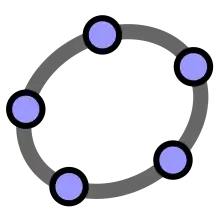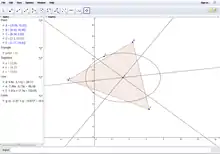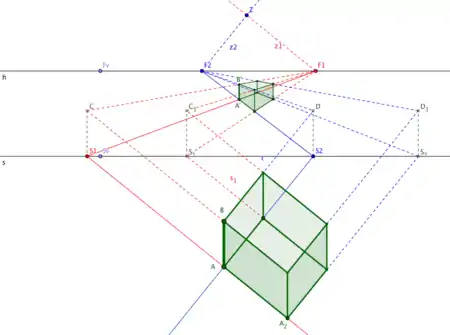


GeoGebra is a free mathematics software program especially created for teaching and learning. It was born as a tool that combines characteristics of Dynamic Geometry Systems (DGS) and Computer Algebra Systems (CAS) [1], but later it incorporated a spreadsheet view, a Probability and Statistics view and a 3D Dynamic Geometry view. It is an open source multiplatform software, available in many languages for Windows, Linux, Mac OS, Android, iPad and it has an easy-to-use interface. [2]
Applications and implications for teaching and learning
According to Brousseau, students’ activity in the Mathematics classroom should be similar to the Mathematician activity [3]. In the classroom, GeoGebra provides an environment for learners to explore, to experiment, to conjecture, which are important activities that sometimes are left aside in detriment of formal algebra activities [4]. On the other hand, it can be used by teachers as an authoring system to create interactive worksheets, simulators, animations and other kinds of resources that improve their teaching activity. This is important, not only for the teaching of Mathematics, but also for the teaching of other sciences. It is also important because it encourages teachers to create their own materials and become authors, and not only consumers of educational software.
Learning Resources
The learning community around GeoGebra
GeoGebra is also a non-profit community of teachers, programmers and researchers, concerned about the teaching and learning of Mathematics and Sciences [5]. This community is organized into 146 Local GeoGebra Institutes distributed all over the world, coordinated by the International GeoGebra Institute [6]. The possibility of joining this net encourages people from different countries to undertake this project and make this tool increasingly powerful, versatile, and more used in the classrooms.
See also
References
- ↑ Hohenwarter, Markus (2013) Conference “Dynamic Mathematics for Everyone” pronounced in IBERTIC – Organización de Estados Iberoamericanos – Buenos Aires. Available at: http://www.ibertic.org/novedades/spip.php?article237
- ↑ http://www.geogebra.org/about
- ↑ Brousseau, Guy (1986) Fondements et méthodes de la didactique des mathématiques, Recherches en didactique des Mathématiques, vol 7.2 pp 33-115. La pensée sauvage. Grenoble
- ↑ Saiz, Irma (2006) La inserción de las tecnologías ¿puede cambiar las prácticas matemáticas actuales? - Available at: http://www.aportes.educ.ar/sitios/aportes/recurso/index?rec_id=107523&nucleo=matematica_nucleo_tic
- ↑ Wikipedia: GeoGebra#Community
- ↑ http://www.geogebra.org/institutes